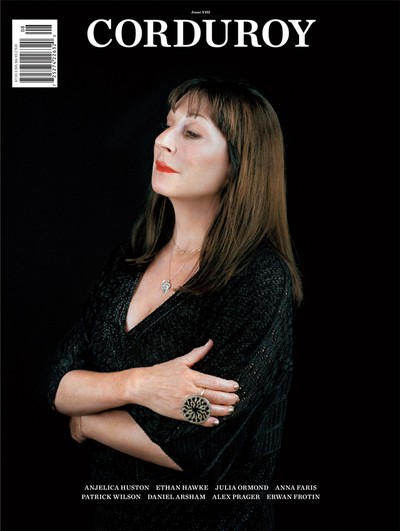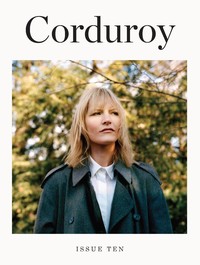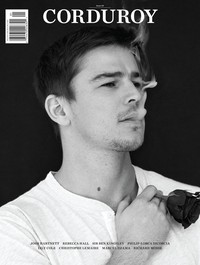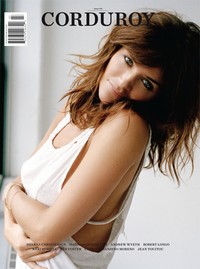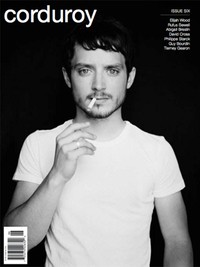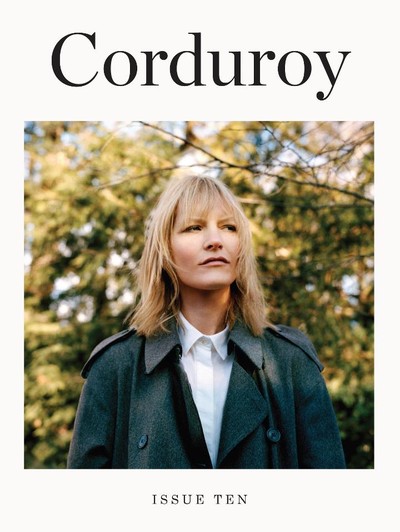
Corduroy
Our magazine is based on the idea that a corduroy jacket never goes out of style. In the same way, we profile actors, musicians, designers and fine artists who aren’t looking to follow mainstream trends, but rather focused on creating something classic.
- 1047 (405)
- Four issues a year
USD 12.00
Anjelica Huston has been many things to many people: a screen legend, a fashion icon; “striking” is a good word to describe her. There’s the effect of her angular, patrician features, her acting talent, often applied to characters with personalities as strong as, but distinct from, her own, and her outspokenness about different aspects of her professional and personal life. She’s a Missoni-gown-clad Amazonian unafraid to tell a rude joke.
“What can I say,” said Jack Nicholson, in a 1989 New York Times profile of Huston. “I can’t come up with words poetic enough to describe her. She has a very strong aura. She struck me as being stunning. Not pretty, but very beautiful in a powerful way. Deep class.”
Given the praise, accorded elsewhere with greater poetry than here or by Nicholson, how does Huston see herself?
“It’s a difficult question, but not really a difficult answer,” she says. “Because you are who you wake up as in the morning. As for me, it’s not like I wake up and I think of that repository of experience that I have. Like, ‘What’s for breakfast?’” she says, laughing. “And, ‘What are the requirements of the day?’ And, ‘What’s next?’”
For this interview, Huston calls from Venice, on Los Angeles’s west side, where she has lived for almost two decades. Conversation feels loose, or at least as easy as a telephone interview between strangers can be, with Huston making funny asides here and there. But there is also a seriousness to her tone. For within the repository she speaks of, are experiences enough to make up multiple careers—which, in essence, she’s had.
(Kimberly Chou)
- To read the rest of this story, pick up Issue 8 of Corduroy…
“There’s this idea that a person’s life is like a staircase,” Ethan Hawke is saying. It’s ten in the morning and he’s sitting in a Chelsea café, in a jean jacket and worn Henley shirt, offering up a metaphor, a philosophy, with the quick sincerity of someone who probably can’t imagine life without either.
The conventional wisdom embedded in the staircase metaphor, Hawke explains, is this: “A mistake happens, a lesson is learned, and you’re constantly growing and growing until you become older and wiser and then you die.” It’s a familiar, somewhat reassuring notion that Hawke lofts up – and now shoots down. “Life doesn’t seem to work that way,” he says. “I think I believed that it would, that I would try these different things — writing, acting, theater, directing — and somehow it would all make it clear where to go. And instead here I am in the middle of my life, completely lost.”
Hawke is a dogged hyphenate, but also a self-deprecating one. Right now he’s grinning, and in a minute or so he will decide that he’s overstated things a bit. Actually, he will reflect between un-self-conscious mouthfuls of scrambled eggs, there are definitely times when he feels a clear sense of purpose. But there seem to be more times when he doesn’t, and that’s what we’re discussing at the moment.
Lately, Hawke has felt most alive in the theater, directing Sam Shepard’s “A Lie of the Mind” and work-shopping with a group of old friends at the Malaparte company. His current fixation is The New Group’s production of “Blood from a Stone,” a darkly comic family drama by the relatively unknown playwright Tommy Nohilly, in which he’s starring alongside Natasha Lyonne and Daphne Rubin-Vega. “It’s a new play and it’s kind of swinging for the rafters, which is awesome,” Hawke explains.
There are many satisfying things about the theater, he adds: the challenge, the bareness, the proximity to home, the fact that a show can’t be replayed like a movie. “It’s all illusory, and the theater kisses that on the mouth,” he says. The auditions for “Blood from a Stone” reeked of excitement and effort, and although Hawke claims that he doesn’t want to be stuck making art in a basement, that’s exactly that scene he draws with great relish:
“The air conditioning is broken, and this playwright has never done a play and he’s swearing and jonesing for a cigarette, and the director is pouring with sweat and we’re reading this thing. Sometimes I get in these cynical places—‘Does any of it even matter?’—but here’s this writer who fucking cares and this director who cares. He’s built this underground theater company for 15 years so that we can do this. And these actors are coming in and they’re not simply memorizing their lines, they’re giving us these personalities. And they’re dripping with sweat, too.”
This is the part of the conversation, the part about sweat and caring, where Hawke changes his mind about being completely lost. “I get confused sometimes,” he decides. “But every now and then I stumble on something I feel certain about, and that feels very good.”
(Darrell Hartman)
ALSO FEATURING: Patrick Wilson Julia Ormond Anna Faris Alex Prager Erwin Frotin Daniel Arsham Stella Schnabel Nathan Fillion Jenny + Johnny Alexandra Daddario Douglas Smith
What do you think of this issue?
Sign up or Log in to join the discussion.
